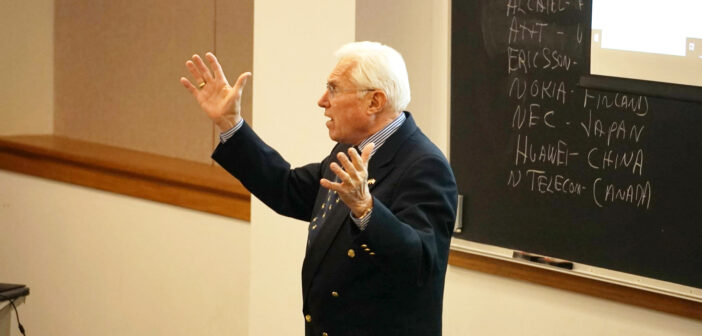Richard M. Brandt, the former director of the Iacocca Institute and an international consultant, spoke to the Lehigh community about the complexities businesses face while being interlaced with government.
Hosted by the Lehigh Management Club on Feb. 20, Brandt discussed his 25-year-long career, where he worked in over 25 countries at AT&T and Lucent Technologies. He helped establish sales organizations while guiding hundreds of sales staff to their companys’ goals.
Leo Carle, ‘26, a co-president of the Management Club, said speaker events like this prioritize getting professionals in front of large bodies of students to talk about the managing side of business.
The inspiration for a global interdependence speaker was to introduce students to the idea of becoming future leaders in the world of business, Carle said.
During his tenure at Lehigh, Brandt met with Lee Iacocca, founder of the Iacocca Institute, to discuss what the institution could do differently to better serve students on an international level.
“We had all these contacts overseas, but the Lehigh students didn’t work overseas, so nobody was doing an internship abroad,” Brandt said. “Iacocca liked the idea of fully-funded internships for our students.”
Iacocca donated $5 million to the project, with Lehigh raising $10 million overall. The program began in 2011 and eventually sent over 500 students abroad.
In his work throughout the United Arab Emirates, Brandt described the crossovers he faced between governmental power and business endeavors.
With Americans having an airbase in Al Raffa, holding over 3,500 servicemen at the time, the area was critical to them, Brandt said.
At the time, Brandt said he was there to sell fiber optic networks to the United Arab Emirates, competing with Germany and France.
“There was going to be a major military conflict at the time,” Brandt said. “I was told to get anywhere in this deal, I would need to talk to the ruler of the part of the country we were working in.”
At 2 a.m., Brandt got the call informing him that a meeting would take place.
He said he was brought to a palace where negotiations would take place, with Americans in one room and the Germans and French right down the hall.
“They walked the Germans by us as they brought them back into the room for more discussion,” Brandt said. “Then I am told by the Arabs that we need to give up all of the work we have been doing if we take the contract and only supply the equipment for the fiber optic network, without installation, which takes away $20 million and gives it to the government.”
Brandt said he realized it was $30 million or nothing. Later, on an electronic board, it was announced that AT&T had won the contract.
“When my guys walked in and said to the government guys that they got the money, the deal was done and the government played a big role in our winning,” Brandt said. “The $30 million led to a bunch of other business as well.”
When you are competing against other companies, Brandt said you are not just competing against them, but against their home countries as well.
“Government, business, (is) all interlaced together,” Brandt said. “If you think you’re going to be straight selling, and you are working for a big company, it’s just not going to work that way.”
Before retirement, Brandt taught classes in the College of Business and the Integrated Business and Engineering Honors Program. In the IBE program, he led an ethics lab for a masters accounting course.
Carle said when he had Brandt as a professor, he talked about the importance of recognizing cultural differences in business, as well as showing students how to successfully navigate the relationship between business and government.
“In one of my IBE seminars, Professor Brandt led a cultural simulation exercise where each student was either a business member in an American company or a member of government in China,” Carle said. “The simulation taught us how to conduct negotiations amidst cultural differences and differences in goals and I wanted to bring this lesson to our club.”
Benjamin Moldovsky, ‘27, an attendee of the event, said that Brandt opened his eyes to the concept of interdependency.
“I find it interesting how involved governments are throughout all business negotiations and how tactical you have to be when selling your product,” Moldovsky said. “Most countries care about whether they have the proprietary information for new software, rather than what the company is actually selling, which is very interesting to think about.”






Comment policy
Comments posted to The Brown and White website are reviewed by a moderator before being approved. Incendiary speech or harassing language, including comments targeted at individuals, may be deemed unacceptable and not published. Spam and other soliciting will also be declined.
The Brown and White also reserves the right to not publish entirely anonymous comments.